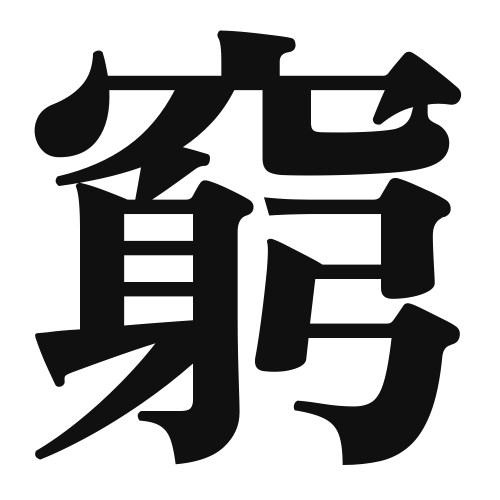1. Overview of Meaning
The kanji “窮” (kyuu) generally means “to be in a difficult situation” or “to be in distress.” It conveys a sense of being trapped or limited, often referring to financial or emotional hardships.
2. Formation and Radical
Formation of the Kanji: The kanji “窮” is a compound character (会意文字) that combines elements to convey its meaning. It consists of the radical for “house” (宀) and the character “窮” which relates to “end” or “extreme,” suggesting a situation where one is confined within a house and facing limitations.
Radical: The radical of “窮” is 宀 (kanmuri), which relates to buildings or houses, indicating that the meaning is connected to a physical space.
3. Examples of Usage
Common Words and Phrases: Some common words that include “窮” are “窮乏” (kyoubou – poverty) and “窮地” (kyoudi – desperate situation).
Example Sentences in Daily Conversation:
- 彼は窮地に立たされている。 (Kare wa kyoudi ni tatasarete iru.) – He is in a desperate situation.
- 窮乏のため、彼は仕事を探している。 (Kyoubou no tame, kare wa shigoto o sagashite iru.) – Due to poverty, he is looking for a job.
4. Synonyms and Antonyms
Similar Kanji: A similar kanji is “困” (kon), which also means “to be in trouble” but can imply a more general sense of difficulty without the specific connotation of being trapped.
Antonyms: An antonym is “豊” (yutaka), which means “abundant” or “rich,” representing a state of plenty and comfort, contrasting with the hardships implied by “窮.”
5. Cultural and Historical Background
Relation to Japanese Culture: The concept of “窮” is often reflected in Japanese literature and art, where themes of struggle and perseverance are prevalent. It highlights the importance of resilience in the face of adversity.
Proverbs and Idioms: One relevant proverb is “窮すれば通ず” (kyuusureba tsuuz), which translates to “When in dire straits, one finds a way.” This reflects the idea that difficult situations can lead to creative solutions.
